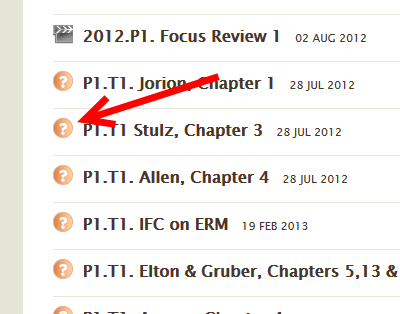RiskNoob
Active Member
Hi David,
Thank you for posting 2013 T6 notes! It must have been tough work in this pressing time since more than half of the T6 chapters got replaced this year.
I notice that T6 is quite a bit of HUGE topic (BT note has ~200 pages, although it has some PQs, and also it is the thickest Part 2 book from GARP, (well, some huge Basel readings, such as Basel II Accords, are excluded in the P2 OR book).
However, personally, T6 is the only topic that I haven't touched so far, and I don't want to spend more than a month for this topic for the May exam due to time constraints (late book arrival from GARP, fulltime work...). Now that you have compiled T6 topic, I am wondering if you notice any T6 topics (especially the new ones) that could be time-trap or low-testability from your perspective - I plan to read/do all of T6 BT note & PQs, but I need to skip some core readings in T6...
Thanks,
RiskNoob
Thank you for posting 2013 T6 notes! It must have been tough work in this pressing time since more than half of the T6 chapters got replaced this year.
I notice that T6 is quite a bit of HUGE topic (BT note has ~200 pages, although it has some PQs, and also it is the thickest Part 2 book from GARP, (well, some huge Basel readings, such as Basel II Accords, are excluded in the P2 OR book).
However, personally, T6 is the only topic that I haven't touched so far, and I don't want to spend more than a month for this topic for the May exam due to time constraints (late book arrival from GARP, fulltime work...). Now that you have compiled T6 topic, I am wondering if you notice any T6 topics (especially the new ones) that could be time-trap or low-testability from your perspective - I plan to read/do all of T6 BT note & PQs, but I need to skip some core readings in T6...

Thanks,
RiskNoob



 The question set and learning process would be so much poorer if 2/3 of the other answers were dummy choices, so thanks again David.
The question set and learning process would be so much poorer if 2/3 of the other answers were dummy choices, so thanks again David.